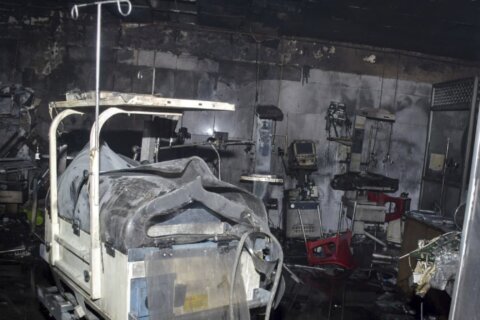WASHINGTON (AP) — Ukraine’s daring ground offensive has taken the fight to Russia, but not nearly as much as its leaders would like because, they say, the United States won’t let them.
The U.S. restricts the use of long-range ballistic missiles it provides to Ukraine, which wants to aim them at military targets inside Russia. Ukraine’s offensive, along with a barrage of drones and missiles that Moscow launched this week, has intensified pressure on the Biden administration to ease its cautious approach to the use of Western weapons in escalating Ukrainian attacks.
The Biden administration says its careful deliberations, including which advanced weapons it supplies to Ukraine and when, are necessary to avoid provoking retaliation from Russian President Vladimir Putin. Some analysts agree Putin would take a Ukrainian strike by an American long-range ballistic missile as an attack by the U.S. itself.
But other American and European supporters of Ukraine say the White House should see that Putin’s threats of attacking the West, including with nuclear weapons, are bluster. Their fear is the U.S. support that has allowed Ukraine to withstand Russia’s 2022 invasion comes with delays and caveats that could ultimately contribute to its defeat.
“This war is going to end exactly how Western policymakers decide it will end,” said Philip Breedlove, a retired U.S. general who led NATO in Europe from 2013 to 2016 and is among the retired U.S. military leaders and diplomats, Republican lawmakers, security analysts and others pushing for a loosening of restrictions on how Ukraine uses Western-provided weapons.
“If we keep doing what we’re doing, Ukraine will eventually lose,” Breedlove said. “Because right now … we are purposely not giving Ukraine what they need to win.”
Lifting such restrictions “would strengthen Ukrainian self-defense, save lives and reduce destruction in Ukraine,” European Union foreign affairs chief Josep Borrell wrote Monday on the social platform X after Russia launched more than 200 missiles and drones at Ukraine. The next day, Russia launched 91 more.
The push and pull is playing out during Ukraine’s surprise offensive into Russia’s southern Kursk region, the first ground invasion of Russia since World War II.
Throughout the war, Ukrainian President Volodymyr Zelenskyy has balanced copious thanks for U.S. support with frustrated appeals for more arms and ammunition. Upping the pressure this month, he again said Ukraine must fight the war as it sees fit with all the weapons at its disposal and appealed for the U.S. to drop a ban on using American long-range ATACMS missiles to strike deeper into Russia.
“A sick old man from the Red Square, who constantly threatens everyone with the red button, will not dictate any of his red lines to us,” Zelenskyy said recently of Putin.
The Biden administration this year allowed Ukraine to fire shorter-range U.S.-provided munitions across the border in self-defense, but not ATACMS.
Ukraine’s defense minister, Rustem Umerov, and presidential adviser Andriy Yermak were coming to Washington this week to discuss the specific long-range military targets that Ukraine would like to hit in Russia, according to a person familiar with the plans. The person spoke on condition of anonymity to share the officials’ plans.
Security analysts say Ukraine is using U.S.-provided HIMARS rocket systems in its offensive. Ukraine also announced it has used a U.S.-supplied glide bomb against Russian forces and deployed its own prototype of a long-range drone-missile hybrid.
Zelenskyy’s military appeared to have launched the ground offensive on Aug. 6 without consulting American leaders.
As Ukraine has claimed hundreds of square miles (hundreds of square kilometers) of Russian territory, it has taken a message from another U.S. ally that receives military support, said Roman Kostenko, a Ukrainian lawmaker and military commander.
“Israel once stated that it is quite respectful of the advice of its partners, but as an independent state, it makes decisions independently,” Kostenko told the Ukrainska Pravda news outlet. “I believe we can mirror this.”
The U.S. has deliberated at length before eventually approving a succession of advanced weapons that Ukraine has pleaded for: modern tanks, precision medium-range rocket systems, Patriot missile batteries, ATACMS for use inside occupied Ukrainian territory and F-16 aircraft.
The Biden administration condemned Russia’s attacks this week on Ukrainian energy infrastructure and is helping bolster its ally’s air defenses, but has not changed its policy on long-range weapons, national security spokesman John Kirby told reporters this week.
A U.S. official, who spoke on condition of anonymity to discuss the government’s internal discussions, said the Biden administration believes there’s no strategic advantage to ATACMS strikes within Russia.
There are too few ATACMS overall to allow Ukraine to hit a significant number of targets within Russia, the official said, adding that Ukraine is using the long-range missiles it has to challenge Russia’s hold on the strategically important Crimean Peninsula.
Russia also has moved many of its aircraft away from what the Institute for the Study of War research group says are 16 Russian airbases within potential range of the ATACMS. That includes aircraft launching the hard-to-intercept glide bombs that Russia is using in Ukraine, the official said.
Many outside the administration disagree. More than 200 other Russian military targets are within ATACMS range in what appear to be carelessly guarded areas along 620 miles (1,000 kilometers) of border, said George Barros, a security analyst focusing on Ukraine and Russia for the Institute for the Study of War, which provides closely watched battlefield analysis of the conflict.
Those targets include large military bases, communications stations, logistics centers, repair facilities, fuel depots, ammunition warehouses and permanent headquarters, Barros said.
While tech-savvy Ukraine is pioneering aggressive new ways of using armed drones and electronic warfare against Russia, hardened targets like bases need the bigger punch that ATACMS can provide, Barros said.
A few selective strikes against some Russian targets would force Putin to shift manpower and resources to protect those targets, he said.
“That is the kind of strain that drastically reduces an attacker’s ability to successfully logistically support their front-line forces,” Barros said.
Ukraine, fighting a far bigger military, needs the battlefield momentum that it hopes surprise offensives, demoralizing attacks within Russia and advanced weapons can provide. While it’s pulled off a feat by deploying armed and uncrewed drone boats to bottle up Russia’s navy in the Black Sea, its biggest battlefield successes were in the first dramatic months of the war.
A 2023 Ukrainian counteroffensive ended without major gains, and then U.S. political deadlock stalled military support for months and allowed Russian forces to gain territory.
In grim conversations this summer, Ukrainians and Americans spoke of the risk of a cease-fire on Russia’s terms. Without leverage from battlefield successes, Ukraine could be forced to cede large amounts of Ukrainian territory and face another invasion later.
Billions of dollars’ worth of U.S. military support is flowing again. Zelenskyy has expanded military conscription. And American military leaders are back to talking of what had been allies’ vision for the next phase of the war, said Bill Taylor, a veteran former diplomat who served as U.S. ambassador to Ukraine from 2006 to 2009.
That is, Ukraine spends the rest of the year rebuilding its ground forces and adding capacity to hit Russia hard enough that it seeks a cease-fire next year on terms Ukraine can accept, he said.
Long-range missile strikes on military targets anywhere inside Russia are part of that, Taylor said. “The Ukrainians should not have to give Russians a sanctuary.”
Copyright © 2024 The Associated Press. All rights reserved. This material may not be published, broadcast, written or redistributed.







